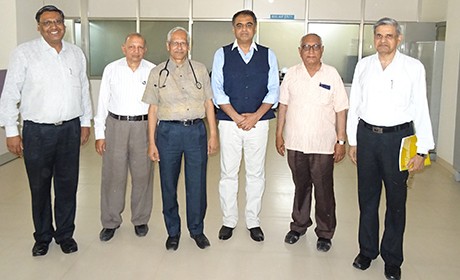Dr Prakash Punjabi, Consultant Cardiothoracic Surgeon at the National Heart and Lung Institute, Imperial College and Imperial College Healthcare NHS Trust - Hammersmith Hospital, London UK and alumnus of MGIMS 1980 batch visited his alma mater on 25 February 2015. He spent a day with his colleagues, classmates, teachers and staff.
Dr Prakash Punjabi has pioneered mitral valve repair in degerative, ischaemic and rheumatic heart disease with innovative techniques. The time was ripe for Dr Punjabi to share his cardiac work with his teachers, faculty and residents. It was heartening to note that worldwide name and fame notwithstanding, Prakash continues to be a self-effaced and soft-spoken cardiologist.
Dr Prakash spoke on Coronary artery bypass surgery- comparing and contrasting the strengths and weaknesses of the two techniques that promise to revasularise the blood-thirsty heart muscle. He drew attention of the audience on the growing epidemic of coronary artery disease in India and explained what preventive measures should every Indian adopt to endure that their coronary arteries are not only clean, but more importantly stay clean.
Dr Prakash also shared his work on mitral valve repair in ischemic cardiomyopathy and showed – drawing heavily from his own data- how a repaired valve and revascularised myocardium can dramatically ease the dis-eased patients fighting with their cardiac problems.
Dr Prakash also showed that not only is he a highly skilled surgeon but also a good researcher. The audience was pleasantly surprised to know that myocardial regeneration using endogenous cardiac stem cells could be a novel and innovative way to get heart in the pink of health. Explained Dr Prakash, “Myocardial infarction leads to loss of cardiomyocytes, scar formation, ventricular remodeling and eventually deterioration of heart function. Over the past decade, stem cell therapy has emerged as a novel strategy for patients with ischemic heart disease and its beneficial effects have been shown by substantial preclinical and clinical studies. Efficacy of several types of stem cells in the therapy of cardiovascular diseases has already been evaluated. However, repair of injured myocardium through stem cell transplantation is restricted by critical safety issues and ethical concerns. Recently, the discovery of cardiac stem cells (CSCs) that reside in the heart itself brings new prospects for myocardial regeneration and reconstitution of cardiac tissues.”
The lecture was attended by the faculty and residents of the department of Medicine, Surgery and Anesthesiology. Among the teachers who applauded Prakash’s wonderful career were Dr Ravinder Narang, OP Gupta, AP Jain and SP Kalantri.
Dr SP Kalantri asked Prakash to reminisce the days he spent in Sevagram (1980-1988). Prakash went down memory lane and told about the outstanding clinical teaching he received from his teachers- especially Dr Narang- and how his Sevagram days have shaped his outlook and both personal professional life.
MGIMS looks forward to more such visits of alumni to their alma mater.

